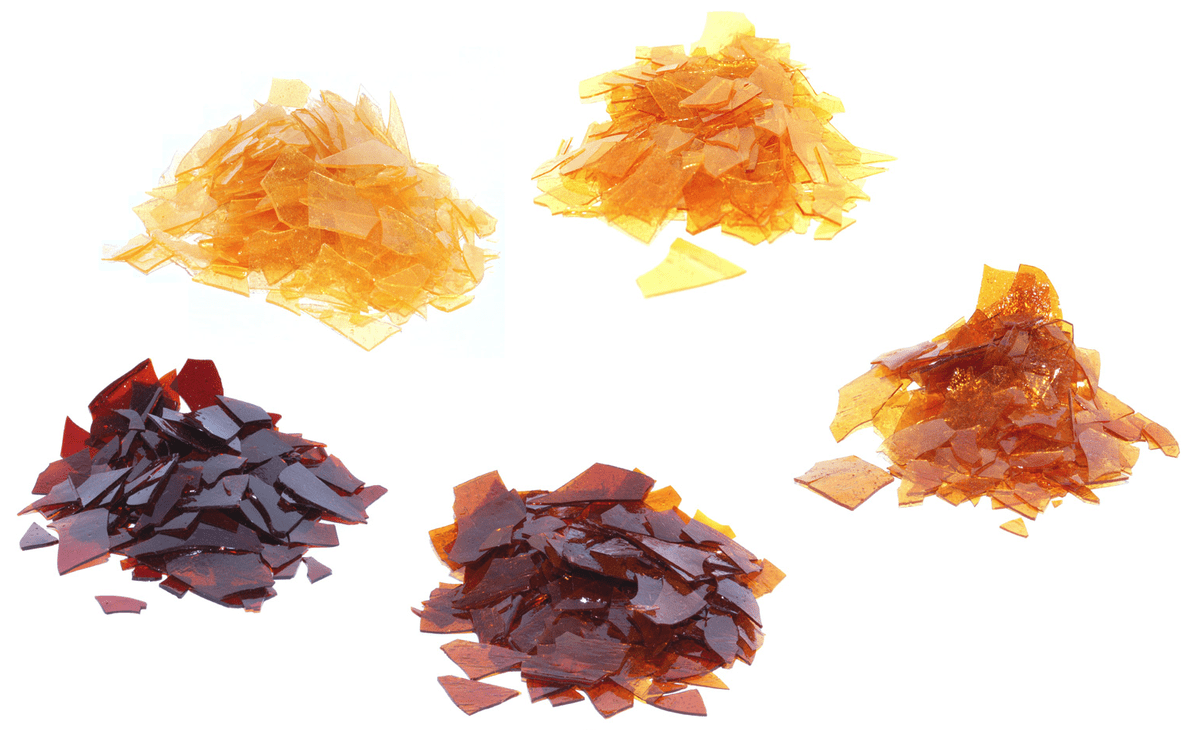Shellac
Shellac is a natural gum resin, a natures gift to the mankind and is used in over 100 industries. We are the leading shellac manufacturers in India
shellac manufacturers in India
Introduction
Shellac is a natural gum resin, a natures gift to the mankind and is used in over 100 industries and is only produced in India, Thailand and china and is exported to over 100 countries of the world. It is natural, non toxic & edible resin. We are the leading shellac manufacturers in India.

Composition
Shellac is a hard, tough and amorphous substance consisting of a solid solution of many complex condensates, together with small but varying amounts of associated Products like:
- Colouring matter
- An odoriferous principle
- Wax
A solvent process removes the wax content and the resulting shellac is known as Dewaxed Lac or Wax Free Lac. Decolorised shellac is obtained by bleaching with activated carbon or with chlorine in an aqueous alkaline solution. The resinous component of lac is a solid solution of condensation products of monobasic and dibasic hydroxy and aldehydic acids.
Chemical properties
- Shellac dissolves in a wide variety of alkaline or rapidly drying alcoholic solvents, but is resistant to a number of other solvents, particularly hydrocarbons.
- Its film show excellent adhesion to a wide variety of surfaces, possess high gloss, hardness and strength.
- Shellac is a powerful bonding material with low thermal conductivity and a small coefficient of expansion.
- It’s thermal plasticity and capacity of absorbing large amounts of fillers are noteworthy. Its electrical properties include high dielectric strengh , low dielectric constant and characteristic freedom from tracking.
- It is particularly resistant to ultra-violet rays.
Properties
Shellac is a hard, tough, amorphous, and brittle resin containing a small amount of wax, a yellow colouring matter and a substance responsible for its characteristic pleasant odour. The lac resin is not a single chemical compound but an intimate mixture of several components. Shellac is slightly heavier than water. Its natural colour varies from dark red to light yellow. When slowly heated, it softens at 65-70c. Shellac is insoluble in water, glycerol, hydrocarbon solvents and esters, but dissolves readily in alcohols and organic acids. The solvent most commonly employed is methylated spirit. Aqueous solutions of inorganic alkalis readily dissolve shellac. Usually the milder alkalis, ammonia, borax and sodium carbonate are employed to prepare aqueous solutions.
Other properties
It is hard, amorphous resin
Has a good resistance against solvents based on hydrocarbon
It is not toxic
Is physiologically harmless
Is thermoplastic
Is approved for various applications in the food industry
Has a low melting point (about 90 c)
Is soluble in lower alcohols and various other solvents
Is uv-resistant
Is water soluble in lower alcohols and various other solvents
Is water soluble in water alkaline solutions
Has excellent dielectric properties, dielectric strength, a low dielectric consent, good tracking resistance etc.
Has excellent film forming properties
Forms smooth, high gloss films and surfaces
Coating do not change their electrical under uv-radiation
Coatings have excellent adhesion to many substrates.
Shellac under tropical conditions of storage, may soften and form a solid block, without adverse effects on its properties. Long storage under adverse conditions, however, may lead to deterioration in properties, even though there may be no change in physical appearance.
When shellac is heated for a long time above its melting point, it gradually loses its fluidity and passes through a rubbery stage to hard, horn-like, infusible and insoluble condition.
Shellac is acidic in character. Acid value is 70. It is an ester. Saponification value 230. It has free five hydroxyl groups and has hydroxyl number 260. It has unsaturation indicated by iodine value of 18. Free aldehylic group also has been indicated by carboxyl value of 18. Average molecular weight 1000. Normal wax content of shellac is 5% which is insoluble in alcohol. Soluble in n-hexane, Pure terpentine, m.t.o. and other hydrocarbon oils. It is hard and having m.p.84 c. It works as a good substitute of carnauba wax.
Shellac Manufacturers in India
Extra ordinary properties of Shellac
Shellac produces glossy smooth, decorative and durable films from its alcoholic solutions, which dry rapidly. These films shows excellent adhesion to a wide variety of surfaces, possess high gloss, hardness, strength and resilience. They are also resistant to the action of ultra-violet rays.
Shellac in alkaline solutions gives good films, which possess high, adhesives power.
Shellac resists the action of hydrocarbon solvents, such as petroleum products.
Shellac is an excellent bonding material with low thermal conductivity and a very small coefficient of expansion.
Shellac has notable electrical properties, a high dielectric strength , a low dielectric constant, and is Remarkable for its freedom from tracking .
Shellac’s thermal plasticity and ready fusibility, coupled with its ability to absorb Large amount of fillers, are valuable for the moulting industry.
Shellac is non toxic.
